
A Guide to the Best Home Security Systems
The security of your home and family have never been more important. In this detailed guide, we rate the best home security systems and companies.
No matter how safe your neighborhood — or even your city — is, you’ve likely considered a security system for your home. But choosing the right one (that won’t cost an arm and a leg) can be confusing. How do you know which company will protect your loved ones and belongings best? And where can you find the best value?
To make the home security shopping process easier, we’ve sifted through the most popular systems on the market today. We’ve evaluated them for reliability, price, customer service, ease of installation, and the equipment offered. Hopefully, this will help you decide which company is the best one to keep you, your family, and the things you cherish safe.
What We Compared
You’ll need to consider several factors when choosing the right home security company. You have quite a few options available to you. So first determine which needs are the most important and what you can live without. Here are the factors we considered:
Installation
When it comes to a security system, you have two installation options: Have the company come in and install your monitoring equipment, or install it yourself. The latter is likely to be the cheaper option,. But it requires you to know what you need and feel confident enough to do the basic wiring.
Some security companies will offer free installation packages for new customers, usually with a signed service contract for a certain number of months of service. This can be a great way to get your system put in your home without paying a penny — or lifting a finger. But be sure to read the fine print.
If you decide to cancel your contract at any time, you may have to pay both early cancellation fees and prorated equipment installation charges. And what if you move? Some companies will offer to move your equipment for you or install a new system in your new home. However, a few of these companies will either require you to sign a new monitoring contract or will charge a small fee for the new install.
Equipment
With some companies, you purchase your monitoring equipment and own it outright. This is especially true for contained systems or companies that require you to install your own system. This also means that you are welcome to move the equipment, with or without new monitoring contracts for your new home.
And what about the $0-installed, basic systems for new customers? Well, as we all know, there’s no such thing as a free lunch.
Be sure that your “complimentary” system won’t cost you more in the long run due to an overpriced monthly monitoring fee. Also, be sure the free system has all the features that you need and won’t wind up costing you a lot more in the end. Basic, free system installations are often limited to a couple doors and windows. Depending on the size of your home, you may need to add a number of additional sensors. And this will likely cost you more.
Some companies offer equipment protection packages in case a sensor breaks or needs servicing. Without this added service, you may be on the hook for a pricey repair or replacement.
Monthly Pricing
Besides equipment and installation charges, you’ll pay monthly monitoring fees for your home security system. This fee ranges quite a bit, depending on the company you choose.
Contained systems are available if you’d rather forgo the monthly cost. Essentially, you can monitor your own home via sensors and even cameras. These systems will make noise if someone trips a sensor. And you can even get notifications if a camera senses movement. However, you won’t have a monitoring company to call the police for you in the case of a break-in or other emergency.
If you want the peace of mind that a monitoring company provides, you’ll pay somewhere between $15 and $100 a month in fees. The average monthly cost is about $30. Some companies will monitor for both security and things like fire and carbon monoxide. This adds peace of mind but may increase the price. With some companies, you can add other features. For instance, you could opt to remotely control your lights and deadbolts. This is nice, but it’ll add to your installation and monthly costs.
Keep in mind that almost all monitoring companies require a contract for service. So, while $45 a month may not sound like a lot at first, it translates to $540 a year for monitoring (plus any equipment and installation charges). Be sure that this fits into your family’s budget before signing any contracts.
Customer Service
How much, or how little, customer service do you expect from your home security system? This may sway you from one company to another.
You may want to choose a company that won’t try to upsell you with high-pressure sales tactics or whose representatives don’t work on commission. You may want to choose a company that has a long history of providing knowledgeable service 24/7 and has a reliable monitoring network.
Technology
The last big consideration when choosing a home security company is the technology. Each company offers a different line of products, ranging from the most basic to the most advanced. So you need to decide what you need (or simply want) before shopping around.
Do you want a security system that allows for remote monitoring of cameras? Maybe you would prefer a system that can not only protect your home but also control things like your lights, door locks, and even your A/C settings. The options are endless, but not every company will have what you need.
Be sure to also take the technology into consideration when comparing prices. The monitoring for a basic, sensor-based system on your doors and windows will likely be much cheaper than a system that allows you to turn off the kitchen lights or lock the front door from your office desk.
Comparing the Top Options
We looked at some of the most popular companies to see which one really is the “best.” Here’s what we found.
ADT
Perhaps one of the most familiar names in the security industry, ADT has certainly been around for the longest. In fact, ADT was started in 1874, albeit as a telegraph company in the beginning. This foundation in communication has served the company well over the years, though. They are renowned for their reliable monitoring of installed systems.
Cost: ADT ranks average in monthly monitoring cost, with a basic essentials package starting at $36.99 a month. Premium Protection packages start at $52.99 a month. However, the company often runs discounts, specials, and deals through certain organizations. For instance, USAA and ADT have a partnership. So members of the military-based association receive discounts on both equipment and monitoring charges.
To see current specials ADT is offering, visit this page. Keep in mind that the company also offers a discount for enrolling in AutoPay.
Contract: ADT requires a contract, typically 36 months long (in California, this is 24 months). Service fees, installation charges, and activation fees vary depending on the package you choose and whether you’re eligible for any sort of discount or special pricing.
Installation: ADT must professionally install all its systems. They regularly offer rebates and new customer specials. And they often offer discounts for existing customers who need to install new systems when they move.
The Customer Installation Charge for a basic system is $99 with a contract. The more equipment you choose, the higher this installation fee can go.
Technology: ADT has come a long way in recent years. When I got my first ADT system a decade ago, it seemed like the company was a bit behind some of the newer, more “hip” competitors out there. The coolest thing they offered at the time was a key fob to activate and deactivate the system without entering my code.
Now, however, ADT is keeping up with the Joneses. They now offer the ADT Pulse system. It’s a touchscreen panel and accompanying app that allows you to control various aspects of your home, monitor the status remotely, and even see which entrances were opened when. You can also install features all the way from basic sensors to glass break alarms, carbon monoxide detectors, and interior/exterior cameras.
Consumer Affairs Rating: 4.5

Frontpoint
A newer name in the home security industry, Frontpoint has already developed quite the positive reputation. The company is not only growing fast and offering cutting-edge technology, but has a long line of happy customers in its wake.
Cost: One of the most commonly-heard accolades for Frontpoint is that they have incredible customer service and no-pressure sales tactics. Their representatives take the time to walk you through their available options and tailor a plan that fits your needs. And they don’t push you to buy pricey packages to boost their own commission. Their pricing is transparent, and you don’t have to worry about hidden fees.
Frontpoint charges between $34.99 and $49.99 a month, depending on the equipment and monitoring you choose. Monitoring is 24/7 and completely wireless/cellular. So you don’t have to worry about setting up a dedicated landline for your system.
You can choose from three equipment packages. They cost between $673 and $972. However, if you have a good enough credit score (600+) and sign a 3-year monitoring contract, they’ll also give you discounts off of your equipment package. This can bring the prices down to between $199 and $599.
You’ll install your own equipment with Frontpoint, which potentially saves hundreds of dollars in fees. They offer online videos and easy-to-use installation guides, claiming that getting your system up and running is a simple, user-friendly process.
Frontpoint also offers a 30-day, risk-free trial. If you’re not happy with the equipment or service, you get your money back.
Contract: Frontpoint requires you to sign a 3-year monitoring contract. However, you can cancel early for a fee. You can also transfer your equipment to a new home at any time without any moving or reactivation fees (or restarted contract periods).
Installation: Frontpoint is a DIY installation system. You’ll receive your equipment in the mail, along with easy-to-follow instructions. They also offer online video guides and FAQ pages to walk you through the process, as well as 24/7 support.
Technology: Frontpoint offers equipment with leading technology, such as touchscreen panels, glass break sensors, smartphone apps with remote system controls, flood sensors, cameras, and panic buttons. They also offer a Crash & Smash protection. Burglars can destroy your home’s smart panel without disabling the tripped sensor — help will still be en route.
Consumer Affairs Rating: 3.8

Vivint
Vivint has been around for almost 20 years, but the name has really only gone mainstream in the last decade or so. However, with their bright orange branding and exciting technology, they’ve become a popular home security option.
Cost: Vivint makes monthly monitoring simple. You’ll pay either $49.99 (basic system), $57.99 (energy management system), or $68.99 (home automation system) a month. No matter which equipment you add to your home, though, this fee stays the same. You’ll receive 24/7 professional monitoring and cellular service — a convenient feature for those without an active landline. Discounted pricing and specials are also available from time to time.
You buy your equipment piece by piece, according to what your home needs. For instance, door/window sensors are $60 each, the main control panel is $699, and fixed video cameras are $149. To learn more about the equipment available, visit Vivint’s page here.
Installation fees vary. The most basic equipment can be DIY installed, but the “smart” equipment requires a professional installation. This installation can range from $99 to $250. But Vivint regularly offers discounts, specials, and rebates to reduce this to little or no cost.
If you’re not happy with the equipment or service, you can legally cancel within three days to get your money back. However, they don’t offer an actual “trial period.”
Contract: Vivint requires contract lengths of either 42- or 60-month periods if you choose the Flexpay option for your equipment. If you need to cancel your contract for any reason, it’ll be difficult to do and involve an early termination fee. You can also transfer the contract in some instances (such as to the new owner of the home or a family member), with approval and a $99 transfer fee.
If you pay for your equipment in full and up-front, you can choose monitoring services without a contract.
Installation: Vivint offers DIY installation for the most basic equipment. However, if you choose any of the more high-tech equipment options, they’ll require you to hire one of their professionals for installation.
Professional installation varies in price from $99 to $250. But Vivint regularly offers specials, discounts, and rebates that lower or even eliminate this expense.
Technology: The tech is where Vivint really shines. They are the home security company to choose if you want a truly smart home system.
Their control panel and app allow for complete home automation. You can view cameras and control the system on the go. And you can even lock doors, control lights, see who is ringing your doorbell, and open or close the garage door — from anywhere!
If you want a system that runs on solar energy, Vivint is the only one to offer this service. They also allow you to control thermostats, lights, and other energy-using appliances remotely, saving you money each month on electricity costs.
Consumer Affairs Rating: 3.8

Link Interactive
If you’re looking for a transparent, easy-to-use, and flexible home security system, Link Interactive might be just the answer for you. There aren’t any hidden fees. It’s easy to see exactly how much you’ll pay for your system, and they have great customer service ratings.
Cost: Link Interactive charges one flat monitoring price: $35.99 a month. If you want video monitoring, it’s an additional $5 a month. If you don’t want any HD monitoring or home automation, take off $5.
That’s it. No packages to choose from or added fees for certain equipment. Just $30.99/$35.99/$40.99 for everyone.
You choose your equipment based on what your home needs. The package you choose is custom according to your specific budget and configuration.
There are no installation or activation fees with Link Interactive. Installation is DIY, and there’s no cost to start using the system once it’s been purchased and set up. Plus, the company also offers a 30-day trial period, so you can try the system before you really commit.
Contract: You’ll need to sign a 3-year contract for your Link Interactive system, during which your rate will be locked in. If you need to cancel your contract before then, you’ll pay an early termination fee. You’ll also get a 3-year warranty on your equipment to match the contract period.
Installation: Link Interactive is an entirely DIY installation system. They offer directions and guides for setting up your home security, and customer service can help you if you have questions along the way.
This means that you’ll potentially save hundreds of dollars in installation fees that you would have paid elsewhere.
Technology: Link Interactive offers systems ranging from very basic to tech-savvy, depending on what your home needs. You can choose home automation equipment such as touchscreen/wireless deadbolts, remote thermostats, and garage door controls. They have z-wave light bulbs that allow you to set schedules and wirelessly control your lighting.
There are, of course, basic offerings like motion sensors, door/window sensors, cameras, and smoke/CO alarms. You can also choose life-saving equipment such as panic or emergency buttons, such as for elderly loved ones.
Consumer Affairs Rating: 4.6

No matter which home security company you choose, be sure to get a final price and read the fine print before signing on any dotted line. Not only will this ensure that you get the right system for your home and family, but you can also avoid overpaying for the wrong service for a years-long contract period.


Article comments